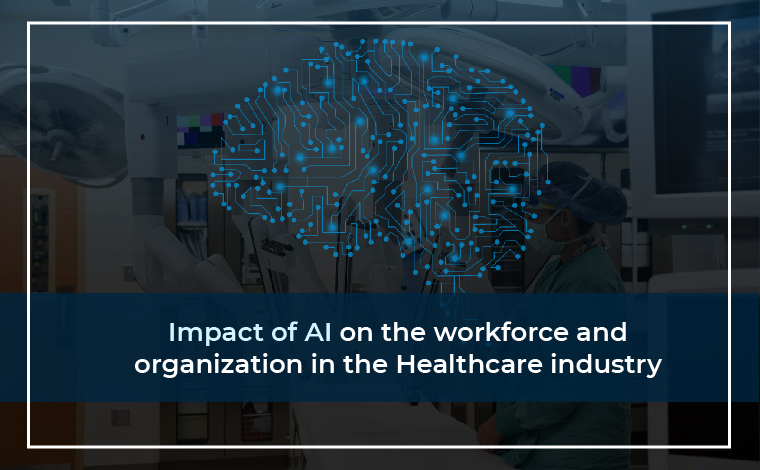
The future is not far when hospitals can function with virtual assistance, very different than they do today. With the boom of Artificial Intelligence, there can be significant changes in healthcare, especially for the healthcare workforce. The most tangible changes can manifest in how the healthcare workers complete their work, greatly impacted by AI, machine learning, and digital robots. Most tasks can be outsourced to technology; health workers’ roles can also evolve.
The emergence of robust technology has instigated fear among the healthcare workforce about losing jobs, impacting the adoption of AI in the health force. Most governments and even policymakers have developed a misconception that the growing adoption of AI would ultimately render jobs redundant, thereby affecting the economic goal of job creation.
However, with the rapid adoption of Artificial Intelligence, it has been observed that employment opportunities are going upscale, making age skills high in demand. Jobs like caregiving and rehabilitation are irreplaceable by AI.
The pivotal idea of integrating AI in hospital management systems is to assist the care providers. As it continues to evolve, more and more job opportunities for new skills can follow. The mere mention of AI builds up images of complex apps and connected devices, the roots of the misconceptions. AI has the potential to enrich and refocus the healthcare workforce towards their professional – direct patient care. AI is going to facilitate the automation of everyday operations for healthcare professionals.
Such solutions are needed urgently as healthcare workers are always struggling to meet the demands. AI would greatly aid in curbing the rising pressure on healthcare workers and meeting the complex and demanding healthcare needs by alleviating workforce shortages and automating some nursing activities. Nevertheless, time is not the only benefit of AI in taking care of health. AI significantly improves healthcare services’ speed, accuracy, and flexibility, rendering better care outcomes, efficiency, and enhanced productivity.
Automating healthcare workforce:
Robotic process automation or RPA can impact the healthcare workforce by adding capacity, cutting operation costs, and reducing manual errors by automating the rules-based and mundane tasks. By transforming data into electronic health records, RPA can allow the workforce to emphasize patient care and tackle important activities that AI cannot perform.
There may be a significant reduction in staffing specializing in these tasks, but it would eventually open new doors to employment for other skill sets. The RPA in healthcare is here to support the human face of healthcare and not deliberately replace it.
Clinicians may find the benefits of virtual robots beyond the sole reason of automation and incorporating more data into their decision-making. Healthcare workflows have already witnessed AI-supported clinical decision support capabilities, improving diagnosis and classification of diseases.
In the future, AI can make a greater sense from biosensors, EMR, unstructured notes, creating a wider context for healthcare workers to deliver more quality and patient-centric healthcare. With such advancements, clinicians can take on new tasks and learn digital skills such as agility, digital AI insight, and much more.
The emergence of new jobs:
Introducing AI in the healthcare workforce can call for new activities and skillsets, shifting focus from ordinary clinical education to more obvious requirements like information retention while advancing innovation entrepreneurship and multidisciplinary working.
AI can change clinical practice greatly, providing healthcare while training algorithms. Staff needs to be trained accordingly with basic digital skills and fundamentals of data science analysis and genomics.
One of the biggest advantages of the new technology in the hospital management system can be the premium placed on positions facilitating the scaling technology. With the convergence of medical and data science, brand new roles can emerge.
Roles regarding data architecture, engineering, data governance, and others can gain momentum. Skilled professionals would be required to define how to record and structure the clinical data so that the algorithms can deliver insights.
Therefore, it has become vital for hospitals and health systems to consider implementing digital assistants in their workforce. The continued prioritization of people skills is elementary.
On a Final Note:
With Simbo.ai, the introduction of artificial intelligence can be scaled to make the “healthcare of the future” a reality. It’s not just about replacing people with machines but is a visionary in its way. Simbo uses AI to assist doctors in every activity, saving more lives through a sustainable healthcare system, enriching lives together!
